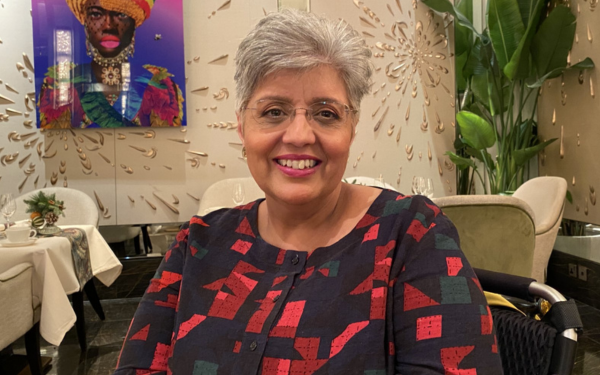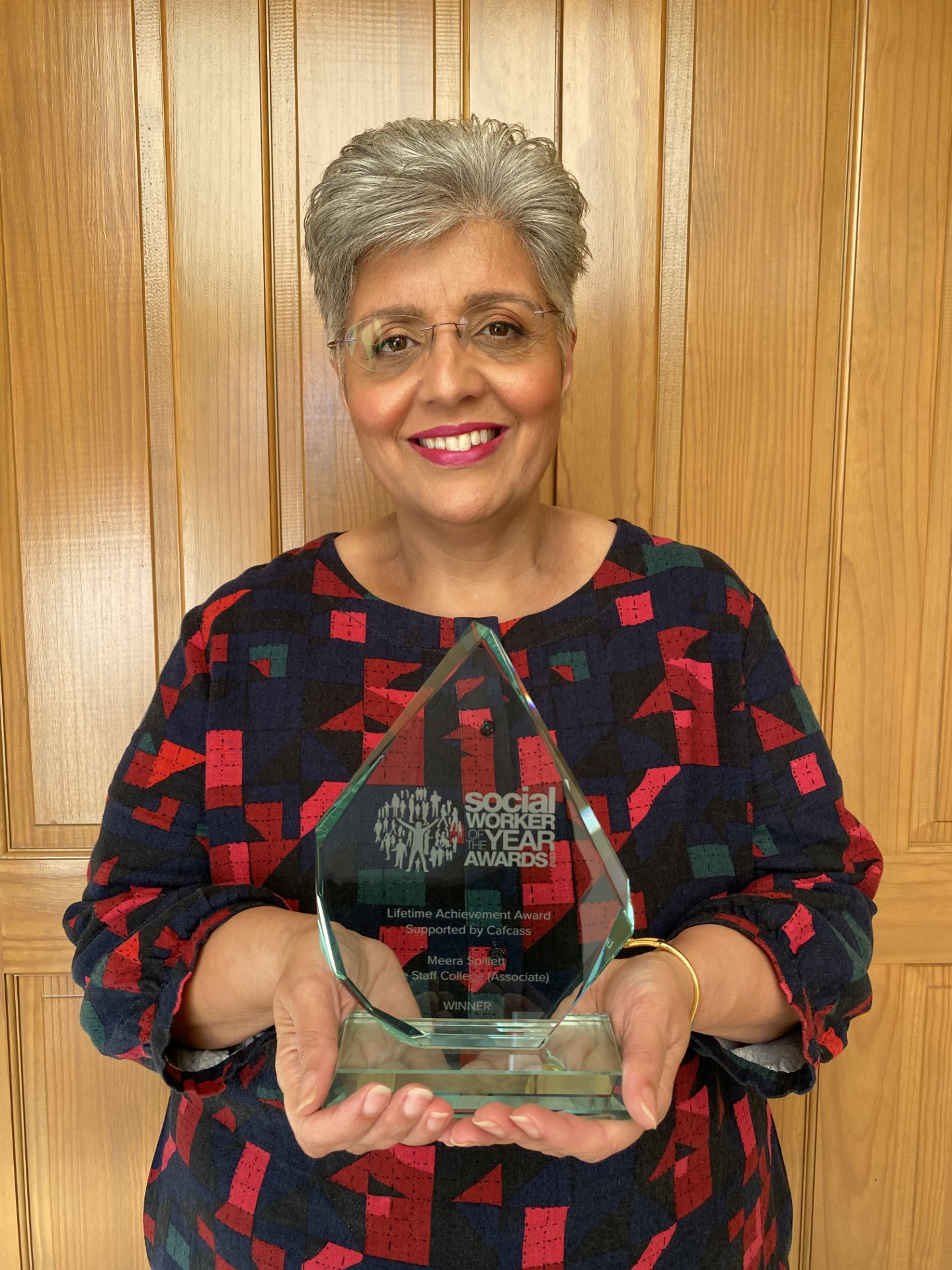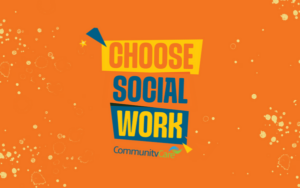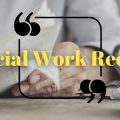
Meera Spillett thought her career was over when she became disabled overnight in 2006.
Unable to walk, she was also living with multiple conditions, one of which prevented her from taking painkillers to soothe her flare-ups.
However, within four years she had achieved her dream of becoming a director of children’s services.
Then, when her health forced her to retire at 44, she launched the Black and Asian Leadership Initiative (BALI) with the Staff College, which has since helped countless black and Asian leaders overcome barriers to progress within their organisations.
For this, Meera won the lifetime achievement award at the 2023 Social Worker of the Year Awards.
Speaking with Community Care, Meera opened up about her time in care, being a disabled practitioner, her influences as a social worker and her work on anti-racist practice.
What experiences have influenced your approach to social work?
My life and my career are inextricably linked. I was taken into care as a baby and adopted by my second foster parents before I was one. My first foster carers gave me the name Meera.
Decades later, I accessed my file and it was just very thin, full of rejection letters as to why they couldn’t take me in. It didn’t name them, so I’ve never met the person that called me Meera.
Luckily, my family got as much information as they could out of my social worker so I had an idea of what had happened.
When I looked at my file, I became more passionate about telling our children why we’ve taken them. I promoted comprehensive case recording so that, when children accessed their files, they understood their story.
I was also labelled as remedial in school – now we’d say SEND – and that stayed with me. To illustrate that, it wasn’t until I got my second degree that I thought, ‘Okay, I’m not remedial’.
We label people in social work and other places too quickly sometimes and we don’t see the harm that that can do and the confidence it erodes.
What has been your ambitions during your career?
My ambition has always been to make a difference in people’s lives. That was why I moved up and around in organisations.
I’ve always been interested in how social workers work alongside those outside their organisation, and how to make the most of that.
After working as a team manager for a couple of years, I became a planning and contracts manager before taking on the role of service manager at [the London Borough of] Newham.
I wanted to learn what other parts of children’s services did and to add a social worker’s perspective. And then I thought, ‘What can I learn next?’.
I was fairly laser-focused on what career path I wanted. It’s good to know where you might be heading because it gives you a way of getting there.
In 2006, you became disabled overnight. How did that experience affect you as a social worker?
I was living in a top-floor flat with no lift and I’d had some problems with my knee. Then one day, I came back from work and I couldn’t feel my left leg. I went to the hospital and never came back to that flat. I couldn’t walk up the stairs anymore.
I was diagnosed with rheumatoid arthritis, which means that my antibodies were eating the linings of my joints. It’s a very painful condition that brings flare-ups.
I can only walk a tiny bit on a good day and it was hard trying to get my head around that. There were lots of tears and anger.
I almost gave up on my dream of being a director of children’s services for a bit, until I decided to work through it.
I was off for about eight months, learning how to manage my disability and regaining my confidence. And, in 2010, I was appointed director of children’s services in Oxfordshire till 2011, when I retired.
How did you deal with the hurdles that came with being disabled?
I’ve got seven long-term health conditions that fight with each other. I can’t take painkillers due to one of them, so I’ve learned to manage the pain with mindfulness. I always try to look at my life as a glass half full, but, don’t get me wrong, sometimes the glass is smashed on the floor.
At the time, I was working at Norfolk Council and they were very proactive because they wanted me back. But there were accessibility problems.
I used to cry or get angry about it. So I started to carry a camera and take photos of where I couldn’t get in and where the problems used to be.
I made a PowerPoint and sent it to the chief executive and things were changed – not just for me but for others in the council and the community. It was my way of regulating my feelings.
I had a scooter so that I could get around, a desk to sit and twizzle so I didn’t have to move during meetings and voice-activated writing. They were also very flexible about difficult mornings.
Following your retirement, you set up BALI. How did that come to happen?

Meera Spillett with her Social Worker of the Year awards trophy
There weren’t many directors who looked like me and there wasn’t a place where black and Asian people could go to have a training session that just included black and Asian people. So myself, Rosemary Campbell-Stephens MBE and the late Patrick Scott developed BALI.
Part of the programme was based on our experiences and strategies for action. Unfortunately, a decade later, I still hear similar types of people saying similar issues are happening to them.
If you are black, there are pressures put on you. We have this saying about whether you are a black leader or a leader who happens to be black. If you’re a black senior leader, there’ll be expectations. Some will say you’re a diversity pick.
So, part of BALI is getting black and Asian social workers ready to survive, challenge the status quo and thrive. It’s great to see now several directors who’ve done BALI and there are many more talented ones in the pipeline.
Were there personal experiences that inspired BALI?
I’ve been exposed to racism since I was young and I’ve always been vocal. I’m passionate about everybody understanding that some people are discriminated against because of their skin colour.
When I was an inspector, I had a joint inspection with other services and the organisation we were visiting had a racism issue. I was the only global majority person and, as we walked in to see the chief executive, one person pointed to me and said to the lead inspector, “Your secretary can wait here”.
Let’s face it, we know that black practitioners are more likely to have fitness to practise reviews and they’re often turning to agencies because the environment they’re in is racist.
We need white leaders to look at their culture because they still try and talk it down. At some point, everyone was telling their stories but has anything happened? No. So why did I bare my soul? I find that quite traumatic when nothing’s changed.
You’ve been an ally but you need to be an accomplice. That means you don’t sit back and go ‘I might say something to someone about that’. We need you to pull your sleeves up and get in there.
What lessons have you learned from your social work career?
It is about social justice. When everybody dived into equality, diversity, and inclusion, I kept saying no, you want another E there and that’s equity. I’m sure you’ve seen the photo of the kids standing on boxes to try and see over the fence. You need to give the little kid a few more, that’s equity.
If it was an anti-racist response, then you’d take the fence down. We need to do that. We need to be intentional about how we tackle racism.
Another lesson was work-life balance – I wasn’t very good at it. I put my heart and soul into work and my body just went nah. You need to build and sustain your resilience, especially when you’re fighting racism.
Get a group of people that you can trust around you. We call them a council of elders at BALI – people that you could turn to for a second opinion. And always keep focused on the people you’re trying to help. Think, if this was your sister or grandpa, would this be good enough?
My final one would be to learn continuously and trust your gut. When I was a new social worker, I had this tricky case and we had to have the police there to remove the baby.
The mother had told me to take the baby, but I had a bad feeling and wanted the mother to put the baby on the pushchair. She insisted I take it from her.
I hesitated but my colleague told me to get on with it and, as he was more experienced, I listened. As soon as I put my hands around the baby’s waist, the person hit me in the face and broke my nose and the baby fell on the floor. So always trust your gut.
Choose Social Work
 We have highlighted Meera’s story as part of our Choose Social Work campaign, which aims to champion the brilliant work social workers do every day, inspire the next generation of practitioners and counteract the negative media coverage of the profession.
We have highlighted Meera’s story as part of our Choose Social Work campaign, which aims to champion the brilliant work social workers do every day, inspire the next generation of practitioners and counteract the negative media coverage of the profession.
You can find out more on our campaign page and by checking out previous stories from Choose Social Work:



 Family help: one local authority’s experience of the model
Family help: one local authority’s experience of the model  ‘I spent the first three months listening’: how supportive leadership can transform children’s services
‘I spent the first three months listening’: how supportive leadership can transform children’s services  How senior leaders in one authority maintain a culture of excellence
How senior leaders in one authority maintain a culture of excellence  How staff support ensures fantastic outcomes for children and families
How staff support ensures fantastic outcomes for children and families  Workforce Insights – showcasing a selection of the sector’s top recruiters
Workforce Insights – showcasing a selection of the sector’s top recruiters 

 Facebook
Facebook X
X LinkedIn
LinkedIn Instagram
Instagram
This is such an inspirational read. Congratulations Meera on your achievement. Thank you for your contribution to the social work profession & your relentless commitment to anti racism.
Absolutely agree! Councils should be employing social workers with lived experience as a norm but my lived experience is they do not. Yes, they interview if you tick the disabled box but when you might need ‘ reasonable adjustments ‘ to do your job there is rarely a job offer. Imho there is embedded racism, disability and ageism across the board where one would expect a far wiser response.
Congratulations Meera and thanks for your honesty. I’m an adult’s social worker with Crohn’s disease and can really relate to what you have shared as a British Pakistani Asian. I’ve been on long term sick leave but I am being welcomed back with flexible working options fortunately this time. I have always trusted my gut and I am really working on my resilience to continue in this field of work. Best wishes.
As always Meera, are an inspiration to so many of us who needed that nod, that nudge and that push. Thank you for giving credence to my work in India and helping me think through difficult conversations which made the big difference.
Congratulations Meera, you are an inspiration to all.